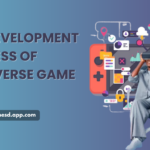Introduction
The metaverse is changing fast the way individuals engage with digital spaces. With virtual reality (VR), augmented reality (AR), and blockchain tech becoming increasingly available, metaverse game development is becoming a primary driver of immersive online experiences. These virtual worlds support gaming, social networking, digital commerce, and more.
In order to develop a metaverse gaming platform that’s scalable and compelling, developers go through a strategy development process using a mix of creativity, innovation, and decentralized architecture. That is a summarized account of metaverse game building from scratch below:
1.Planning and Conceptualization
Metaverse game development begins with concept creation. The vision, key gameplay mechanics, and final purpose of the virtual world are set by developers.
- Develop a concept for game and story
- Identify players and their behaviors
- Define monetization frameworks (e.g., NFTs, tokens)
- Define technical requirements and scope
Effective planning results in smooth operations in the subsequent stages.
2.Virtual World Designing
Design is one of the central aspects of player experience. The process of crafting the appearance, feel, and structure of the virtual world during this phase occurs.
- Develop 3D models, characters, and environments
- Prioritize UI/UX design for ease of navigation
- Implement immersive worlds utilizing software such as Blender
- A rich and interactive visual space is crucial for player interaction.
3.Choosing the Technology Stack
The technology stack chosen plays a crucial role in the success of metaverse game development. Developers choose engines, libraries, and cloud solutions specific to the needs of the project.
Unity: A general-purpose engine well-suited for cross-platform development, with VR/AR support, real-time rendering, and an extensive asset store.
Unreal Engine: Famous for upscale graphics and cinema-style experiences, ideal for large-scale, detailed metaverse worlds.
Web3.js and Ethers.js: These libraries add support for blockchain functionality like NFT transactions, wallet integration, and smart contract calls.
Blender: Open-source software for 3D creation used to create avatars, virtual assets, and animations needed for engaging gameplay.
Amazon Web Services (AWS): Offers cloud infrastructure to enable multiplayer features, data storage, and scalability.
The right tech stack ensures a smooth, scalable, and immersive experience.
4.Blockchain Integration
Blockchain is a major pillar of metaverse game development, enabling true digital ownership and decentralized experiences.
- Create NFTs for in-game assets and collectibles
- Build play-to-earn economies using tokens
- Use smart contracts for transparency and automation
- Enable user control through decentralized governance (DAOs)
Blockchain integration makes virtual environments more interactive and secure.
5.Game Logic Development and Testing
After assets and infrastructure are available, the development of the core begins. Coding game mechanics, systems, and testing are a part of this.
- Develop multiplayer mechanics and game logic
- Integrate game with blockchain features
- Perform performance and security testing across devices
- Correct bugs and game flow optimization
Extensive testing guarantees a launch that is bug-free and high-quality.
6.Deployment and Maintenance
Once tested, the game is rolled out on supported platforms (web, mobile, VR). After launch, developers keep an eye on performance and further refine the experience.
- Release updates and fresh content
- Gather feedback and refine gameplay
- Scale infrastructure according to user activity
- Offer technical support and resolve issues
- Continuous development keeps the platform fresh and ready for the future.
Why GamesDApp opt for Metaverse Game Development
GamesDApp is a reliable name in metaverse game development with end-to-end solutions from concept to deployment. With proficiency in Unity, Unreal Engine, blockchain integration, and cloud infrastructure, they turn engaging virtual experiences into reality.
- Full-cycle development assistance
- Both design and blockchain expertise
- Customized and scalable solutions for various industries
- Successful experience in developing successful metaverse projects
Conclusion
As the online universe turns towards immersive and decentralized experiences, metaverse games will keep influencing the future of gaming and interaction. Creating dynamic and interesting virtual worlds has never been easier with the right tools, technologies, and development process.

